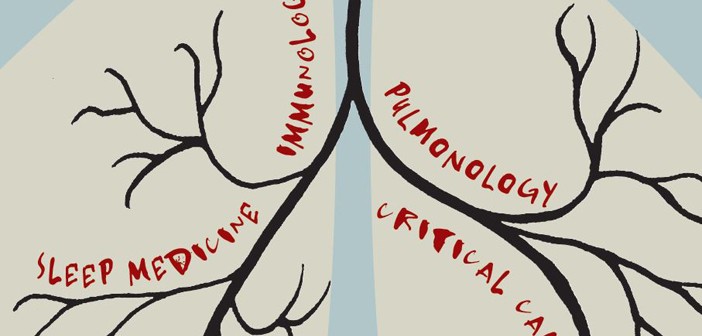Surviving Sepsis
You must pass through a dimly lit, spooky basement hallway—passing a door with a sign that reads “Infectious Disease Storage Area”—to get to the office of Steven Opal, MD, professor of medicine. The office itself is cheery. There’s a wall filled with diplomas and a desk stacked with scientific papers. Opal wears a warm smile and a lab coat with a pocket stuffed with pens and a large button that says, “Ask me if I washed my hands.”
Opal has nothing but praise for BIRDs. “I’m involved in septic shock, and the lung is one of the organs that is involved in septic shock,” he says. “It’s good to see that there’s a substantial number of people who are doing very useful basic research on lung injury. To me it’s great.”
Septic shock, or sepsis, occurs when a severe infection—generally caused by bacteria—attacks multiple organs. It is a serious condition that can cause dangerously low blood pressure and even death. As many as 70 percent of septic shock cases are initiated in the lung— often from pneumonia.
The recovery of lung function is key to surviving sepsis. Even if all the other organ systems improve, “if the lungs don’t get better, the patient doesn’t get better,” Opal says. “The lung is an unforgiving organ.”
Opal heads international multicenter trials for new sepsis drugs as part of the Ocean State Clinical Coordinating Center (OSCCC). Clinicians from across the globe call the OSCCC to see if their sepsis patients qualify to be part of a clinical trial. Opal and his colleagues must make sure that patients are sick enough to warrant being part of a placebo- controlled trial with an experimental drug, but not so sick that they are beyond hope. “That sometimes gets to be a difficult decision to make,” Opal says. “That’s part of the art of medicine.”
Time is of the essence for patients with sepsis. “It’s a 24/7 job, as you might imagine,” he says. “Of course we have to respond right away because they’re in the middle of some crisis at the other end of the phone.”
Opal has been coordinating clinical trials for sepsis with the OSCCC for about 10 y ears a nd h as s tudied s everal d ifferent types of drugs, from anticoagulants to anti-endotoxin drugs to new antibiotics. Studying the latter is particularly important given the rise in antibioticresistant bacteria. “We’re very struck by how resistant bacteria are in some centers, particularly in some parts of the world,” says Opal. “Greece and Italy along the Mediterranean have lots of resistance problems.”
Besides running these clinical trials, Opal studies how microorganisms interact with their hosts to cause disease. He is particularly interested in regulatory enzymes called sirtuins. These proteins get turned on in times of stress, like during starvation or after injury. “They are designed to keep you alive,” he says. Sirtuins are prosurvival enzymes because they have the power to turn off other regulatory proteins by removing acetyl groups: “it’s almost putting the cell to sleep or in hibernation while the acute injury is present.” Opal is studying drugs that activate sirtuins to see if they can help animals fight early stages of infection. So far the data, particularly in an animal model of pneumonia, are encouraging.




